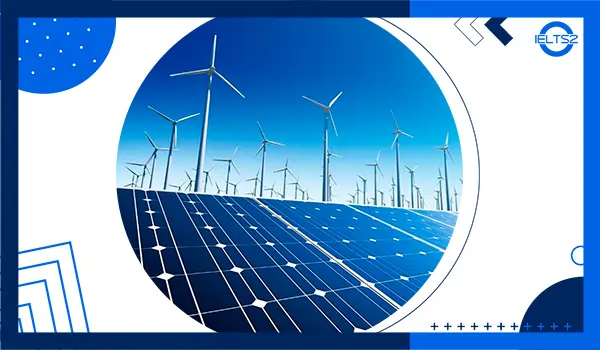نمونه سوالات اسپیکینگ آیلتس درباره انرژی های تجدید پذیر (پارت 1 2 3)
در این بخش بیش از 20 مورد از نمونه سوالات اسپیکینگ آیلتس نمره 9 درباره “موضوع انرژی های تجدید پذیر” را با هم میبینیم. این مجموعه از آخرین سوالات گزارش شده از سنترهای برگزار کننده آیلتس در ایران و خارج از کشور مربوط به پارت 1، 2 و 3 می باشند و شانس تکرار آن ها در آینده بالاست. در ادامه مطلب همچنین نکات گرامری، لغات و دلایل دریافت نمره 9 را به طور مشخص توضیح داده ایم تا راهنمایی برای علاقمندان باشد. 1000 نمونه سوالات اسپیکینگ آیلتس با جواب PDF پارت 1 2 3 پیشنهاد بعدی ما به شما عزیزان است.
نمونه سوالات اسپیکینگ آیلتس درباره موضوع انرژی های تجدید پذیر (پارت 1)
Part 1: IELTS Speaking Questions and Band 9 Sample Answers
- Do you think renewable energy is important?
Yes, I strongly believe renewable energy is vital for our future. It reduces our dependence on fossil fuels and helps combat climate change. By using sources like wind, solar, and hydro, we can produce clean electricity and reduce pollution. Also, investing in renewables creates new jobs and drives innovation, which benefits both the environment and the economy in the long term. - Have you ever used any renewable energy sources?
Yes, my family installed solar panels on our roof two years ago. Since then, we’ve been using solar energy to power our home. It’s been a fantastic experience—we’ve seen a noticeable drop in our electricity bills and feel good knowing we’re reducing our carbon footprint. It’s definitely a step toward a more sustainable lifestyle. - Are there many renewable energy sources in your country?
Yes, in recent years, my country has made great strides in renewable energy. We have large wind farms in the coastal areas and solar energy projects in the desert regions. Hydropower is also widely used, especially in mountainous regions. The government is actively promoting clean energy, so the industry is growing steadily. - Would you like to use renewable energy at home?
Absolutely. In fact, I already do! As I mentioned earlier, we use solar panels. In the future, I’d love to add a home battery system to store excess energy. That way, we could be even more energy-independent and reduce our reliance on the national grid. - What forms of renewable energy do you know about?
I know about solar, wind, hydroelectric, geothermal, and biomass energy. Each has its own advantages. For example, solar is ideal for sunny areas, while wind is great for coastal or high-altitude regions. Hydropower is reliable in places with strong rivers. These diverse sources offer flexible solutions for different environments. - Do people in your country support renewable energy?
Generally, yes. Many people are becoming more environmentally conscious and support clean energy initiatives. Although some worry about the cost of switching, public opinion is mostly positive. Government campaigns and educational programs have helped raise awareness about the long-term benefits of renewable energy. - Is it expensive to use renewable energy?
Initially, it can be costly to install systems like solar panels or wind turbines. However, over time, the savings on electricity bills can outweigh the initial expense. Additionally, many governments offer subsidies and tax incentives, making it more affordable for individuals and businesses to invest in renewables. - Do you think renewable energy can replace fossil fuels?
I believe it has the potential to eventually replace fossil fuels, especially as technology improves. However, this transition will take time. We need better infrastructure, storage solutions, and global cooperation. Still, the progress we’ve made so far is promising and shows that a fossil-free future is possible. - Are you interested in learning more about renewable energy?
Yes, I find it fascinating. I often read articles and watch documentaries about green technology and sustainable practices. Understanding how energy systems work and how we can improve them is crucial for creating a better future. It’s also a field with exciting career opportunities. - What do you think the future holds for renewable energy?
I think the future is bright. As demand grows, we’ll see more innovations in efficiency and storage. Prices will continue to drop, making clean energy accessible to more people. With political will and public support, renewable energy could soon become the dominant source of power worldwide.
نمونه سوالات اسپیکینگ آیلتس درباره موضوع انرژی های تجدید پذیر (پارت 2)
Part 2: IELTS Speaking Cue Card and Band 9 Sample Answer
Describe a form of renewable energy that you think is useful. You should say:
What it is
How it works
Where it is used
And explain why you think it is useful
Band 9 Sample Answer
One form of renewable energy that I find extremely useful is solar energy. Solar energy harnesses sunlight and converts it into electricity using photovoltaic panels, commonly known as solar panels. These panels are typically installed on rooftops or in solar farms, where they can capture direct sunlight and convert it into a usable form of power.
The way it works is relatively simple but highly effective. When sunlight hits the panels, it excites electrons within the photovoltaic cells, generating a flow of electricity. This energy is then stored in batteries or fed into the power grid, depending on the setup. In some advanced systems, excess electricity can be stored and used later, such as during nighttime or cloudy days.
Solar energy is widely used around the world. For example, countries like Germany, China, and Australia have heavily invested in solar power infrastructure. Even in my own country, there are growing numbers of homes and businesses using solar panels to reduce their dependence on conventional electricity. It’s especially popular in sunny regions where solar radiation is abundant.
I think solar energy is incredibly useful for several reasons. Firstly, it is a clean and abundant energy source that doesn’t produce any greenhouse gases or pollutants. This means it helps combat climate change and reduces air pollution. Secondly, once the initial installation is complete, it’s very cost-effective. People can save a significant amount on their electricity bills over time. Thirdly, solar technology continues to improve, making it more efficient and accessible every year. Lastly, it promotes energy independence, allowing individuals and communities to generate their own power and be less reliant on fossil fuels or national grids. Overall, solar energy is a practical, eco-friendly, and forward-thinking solution that holds tremendous potential for shaping a sustainable future.

نمونه سوالات اسپیکینگ آیلتس درباره این موضوع (پارت 3)
Part 3: IELTS Speaking Questions and Band 9 Sample Answers
- What challenges do governments face when promoting renewable energy?
Governments often struggle with balancing economic priorities and environmental goals. Investing in renewable infrastructure requires substantial funding, and not all countries have the budget. Additionally, existing fossil fuel industries can resist change due to economic interests. Educating the public and managing the transition without disrupting energy supply are other key challenges that require strategic planning and long-term commitment. - How can individuals contribute to the use of renewable energy?
Individuals can play a major role by adopting solar panels or supporting green energy providers. Reducing overall energy consumption, using energy-efficient appliances, and advocating for eco-friendly policies also make a difference. Educating others and creating community initiatives, such as solar cooperatives, can help raise awareness and accelerate the transition to renewable energy. - Do you think all countries can equally benefit from renewable energy?
Not equally. While some countries have abundant sunlight, wind, or water resources, others might face geographic or economic limitations. However, every country can find at least one renewable source that suits its environment. International cooperation and technology sharing can help bridge the gap and ensure more equitable access to sustainable energy. - Should schools teach students about renewable energy?
Absolutely. Introducing students to renewable energy from a young age fosters environmental awareness and responsible citizenship. It can also inspire interest in science and technology. By integrating renewable energy topics into school curricula, we empower the next generation to innovate and support a greener, more sustainable future. - How has technology improved the efficiency of renewable energy?
Technological advancements have significantly improved energy conversion rates and storage capacity. For example, modern solar panels are more efficient than earlier models, and wind turbines can now operate at lower wind speeds. Battery storage solutions and smart grids also enhance reliability, making renewable sources more practical and scalable. - Do you think traditional energy companies will adapt to renewable trends?
Many traditional energy companies are already investing in renewables as part of their diversification strategies. They recognize the growing demand for clean energy and are shifting toward hybrid models. Although some may resist initially, market forces and environmental regulations will likely push them to embrace sustainable alternatives. - What role does government policy play in advancing renewable energy?
Government policies are crucial. Subsidies, tax breaks, and research grants encourage innovation and adoption. Regulations can also mandate renewable usage targets for industries and utilities. Without supportive policies, the renewable sector struggles to compete with fossil fuels, so legislative action is essential to drive long-term change. - Why is renewable energy considered more sustainable than fossil fuels?
Unlike fossil fuels, which are finite and emit harmful gases, renewable energy comes from naturally replenishing sources like sunlight and wind. It produces little to no pollution and has a minimal ecological footprint. This makes it far more sustainable, as it meets current needs without compromising the planet for future generations. - Can renewable energy create job opportunities?
Yes, the renewable energy sector offers a wide range of jobs—from manufacturing and installation to research and maintenance. As global investment in clean energy grows, so does the demand for skilled workers. This transition not only helps the environment but also boosts economic development and employment. - What are some limitations of renewable energy?
Renewable energy can be intermittent—solar depends on sunlight and wind on weather. Energy storage solutions are improving but still expensive. Infrastructure upgrades are needed to integrate these sources into existing grids. Despite these limitations, continued research and innovation are helping overcome these challenges steadily.
پاسخهای ارائه شده به دلیل استفاده از عناصر زیر قابلیت کسب نمره 9 را دارند:
در اینجا دلایل کسب نمره 9 این پاسخ به سوال اسپیکینگ آیلتس با موضوع انرژی های تجدید پذیر را با هم میبینیم:
- دامنه واژگانی پیشرفته: استفاده از لغاتی مانند “photovoltaic,” “eco-friendly,” “innovation,” “intermittent,” و “sustainable” نشان دهنده دانش واژگانی بالاست.
- سیاق منطقی و سرشته دار: پاسخها دارای سازماندهی منطقی هستند و هر فکر با مثال یا توضیحی تقوییت شده است.
- گرامر صحیح و متنوع: استفاده از جملات شرطی (If-clause)، فعلهای modal (مانند “could,” “should,” “might”) و زمانهای مختلف نشان دهنده توانایی زبانی بالاست.
- محتوای عمیق و موضوعمحور: پاسخها به طور کامل به سوالات مرتبط هستند و نشان میدهند که کاندید تفکر عمیقی دارد.
این نکات همه میتواند موجب دریافت کاملترین نمره گویش (اسپیکینگ) در آزمون IELTS شوند.
مطالبی برای مطالعه بیشتر
چه مدت زمانی برای آمادگی اسپیکینگ مناسب است؟
چطور میتوانم برای اسپیکینگ آیلتس بهتر آماده شوم؟
ساختار صحیح پاراگراف در رایتینگ آیلتس (تسک 2)
اسپیکینگ آیلتس منابع طبیعی (جدیدترین نمونه سوالات)
اسپیکینگ آیلتس محیط زیست (پاسخ نمره 9)
تعیین سطح رایگان اسپیکینگ ❤️
نمونه سوالات اسپیکینگ آیلتس درباره “موضوع انرژی های تجدید پذیر” پارت 1 2 3 را به همراه سمپل های نمره 9 آن ها با هم دیدیم. در ادامه نمونه سوالات دسته بندی شده اسپیکینگ آیلتس پیشنهاد آخر ما به دوستان گرامی هست. این نمونه سوالات اسپکینگ از پرتکرار ترین تاپیک های این بخش و همچنین جدیدترین موضوعات می باشند. این مجموعه توسط یکی از سایت های معتبر و فعال آیلتس تنظیم شده است. همچنین برای تعیین سطح و تعیین رایگان نمره اسپیکینگ و دریافت جدید ترین سمپل های نمره 9 در کانال تلگرام اسپیکینگ ما همراه باشید و به ادمین برای تعیین نمره اطلاع دهید.






